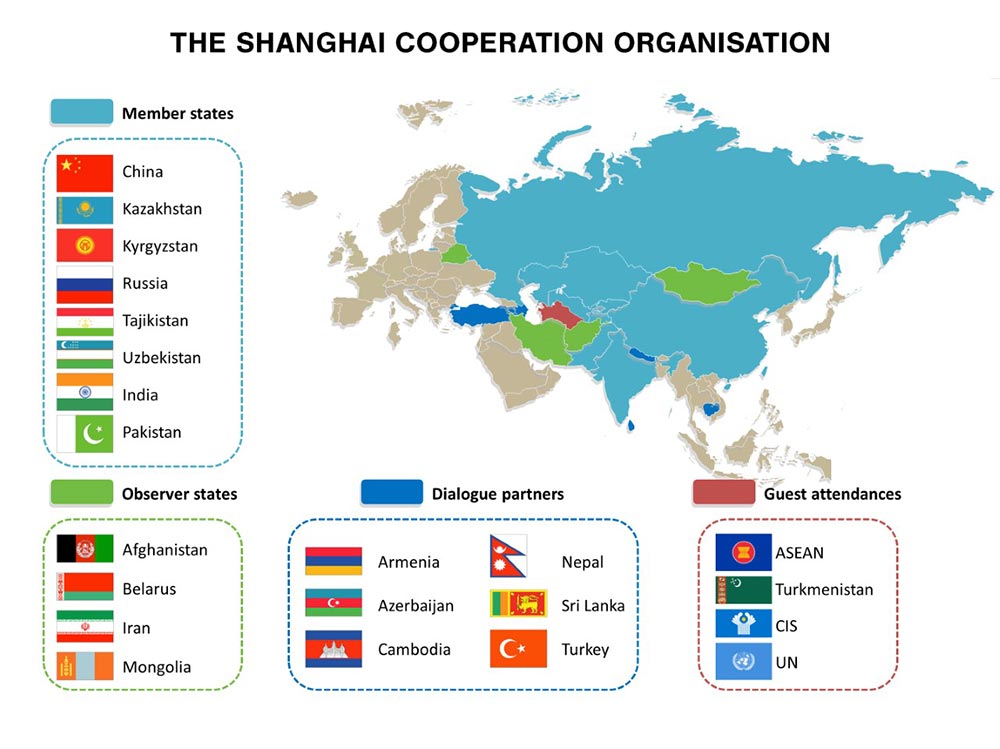Shanghai Cooperation Organisation Pursuing Eurasian Regional Trade Alliances
New Eurasian Trade & Security cooperation being developed in moves that impact all of Asia and usher in the Great Eurasian Partnership
Russia’s Special Presidential Envoy for Shanghai Cooperation Organization (SCO) Affairs Bakhtiyer Khakimov has stated that the SCO is working on a memorandum of understanding with the Eurasian Economic Commission (EAEU), and trade agreements with other multilateral organizations.
Khakimov stated that “The SCO maintains ties with the United Nations and trade organizations such as ASEAN, the Collective Security Treaty Organization (CSTO), the Commonwealth of Independent States (CIS) and a number of other countries. A memorandum of understanding between the SCO and the Eurasian Economic Commission is in the pipeline, and is aimed at building trade ties with the Eurasian Economic Union.”
Both China and Russia have previously expressed their intent to merge China’s Belt & Road Initiative with the EAEU, with China having got as far as signing off an as yet non-preferential free trade agreement with the Union, which includes Armenia, Belarus, Kazakhstan, Kyrgyzstan, and Russia and which extends geographically across Eurasia from West China to the borders of the European Union. Negotiations are continuing on tariff reductions.
The SCO includes China, as well as three EAEU nations Kazakhstan, Kyrgyzstan and Russia, the CIS nations of Tajikistan and Uzbekistan in addition to India and Pakistan. Afghanistan, Belarus, Iran, and Mongolia are participating observer nations, Armenia, Azerbaijan, Cambodia, Nepal, Sri Lanka, and Turkey dialogue partners, with Turkmenistan an official guest.

In addition to these countries, several others have applied for observer or dialogue status, including Bahrain, Bangladesh, East Timor, Egypt, Israel, Iraq, Maldives, Saudi Arabia, Syria, Qatar and Ukraine.
Khakimov also said that “work continues on several other documents” concerning relations with the Arab League and the UN Industrial Development Organization (UNIDO).
“The SCO is improving and changing as it grows,” Khakimov went on to say. “It has very promising and impressive potential.”
One of the main challenges that the SCO is facing is the need to raise the level of economic cooperation between member states, as identified by President’s Xi and Putin, to match their political dialogue and security partnership. “The SCO is evolving. It wouldn’t be an exaggeration to say that the SCO has become a success story, and it has every reason to seek an interesting and strong role in many fields, particularly in terms of ensuring regional stability, including in Afghanistan.” Khakimov stated. The United States and NATO military are withdrawing from Afghanistan in three months’ time. China, Russia, and SCO members will instead have to structure a lasting peace in a conflict that has blighted the region for over 30 years. It now appears SCO member states will be part of that security operation.
“This year, the Peace Mission anti-terror drills that were scheduled for last year will take place. The Russian Defense Ministry is already preparing for them, and preparations have already been completed.” Kharikov said. The SCO Regional Anti-Terror Structure also plans to hold anti-terror drills in Pakistan, in preparation for managing regional security issues.
Chris Devonshire-Ellis comments “These developments will have a huge impact on Eurasia, and all of Asia. With the US and NATO leaving Afghanistan, the onus is now on China, in conjunction with Russia to maintain the peace. If this can be achieved – and both countries foreign ministers have been extremely active this year in visiting regionally influential parties such as Iran, Saudi Arabia, Pakistan, and India as well as Turkey and the Central Asian states, then the region will begin to restructure and redevelop. That is good news for the entire region as new markets and investment opportunities emerge.
It also allows the United States to exit a region that has caused it nothing but trouble and vast numbers of casualties and wasted expenditure in return for very few strategic assets such as energy or similar commodities. That both saves the US a huge amount of money – that it can put instead into developed Latin America as part of its ‘Build Back Better World’ (B3W) initiative that it launched earlier in the week. These two issues are related and place Eurasia firmly in the hands of Asian, rather than Western management and development. The implications moving ahead are enormous if this proves to be a success.”
Related Reading
About Us
Silk Road Briefing is written by Dezan Shira & Associates. The firm has 28 offices throughout Asia, and assists foreign investors into the region. For strategic advisory and business intelligence issues please contact the firm at silkroad@dezshira.com or visit www.dezshira.com





